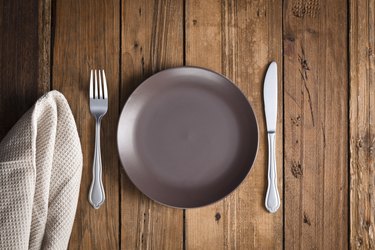
Going without food for several hours can sometimes feel like an impossible task. But how would you feel if you had to go days without any significant source of calories? It is a question asked by people interested in fasting, as well as those planning for an emergency.
Tip
The number of days you can survive without food depends on several factors, including your current body weight, activity level, overall health and age.
Video of the Day
How Long Without Food?
When you severely limit calories or stop eating for a certain length of time, your body will think it's entering a famine. When this happens, the Academy of Nutrition and Dietetics explains that your body needs to do more with fewer calories. As time goes on, your body will adapt to this restricted calorie intake, and consequently, use fewer calories to perform the same tasks. This is not great news for anyone wanting to lose weight and keep it off long-term.
Video of the Day
Additionally, the UCLA Center for Human Nutrition, says that eating fewer than 1,000 calories per day has the same effect physiologically. They go on to say that after four or five days, your appetite will diminish, and in most cases, you will no longer be hungry.
Defining an exact number of days you can survive without food is next to impossible. In fact, there are no current scientific studies or research that explore this topic in-depth. However, an older study that looked at starvation points to a range of days.
A November-December 2009 review published in Archiv Fur Kriminologie analyzed how long people can survive after being trapped or buried alive. Through reports from the popular press and other input, the researchers found that it seems possible to survive without food and drink for eight to 21 days. But if you are only deprived of food, this range could go up.
The Importance of Hydration
The exact number of days you can go without food depends on a variety of factors such as your age, activity level, current weight and other health concerns. Because of this, experts talk more about a range of days, which can be anything from a little over a week to over one month.
But when it comes to hydration, the range gets narrowed down a bit, and the number of days is far less than the number of days you can survive without food. Just like the number of days without food, determining the exact number of days you can survive without water is not an exact science and it depends on many factors. That said, once dehydration sets in, you may only have a matter of days before the effects of no water become grim and dangerous.
Dehydration is a real concern for athletes, anyone living in hot climates or in ill health. The Centers for Disease Control and Prevention, says water helps your body control its temperature, lubricate and cushion joints, protects the spinal cord and gets rid of waste through perspiration, urine and bowel moments. The Mayo Clinic cites several symptoms of dehydration including, extreme thirst, less frequent urination, dark-colored urine, fatigue, dizziness and confusion.
Read more: How Can I Tell When My Body Is Hydrated?
Optimal Number of Calories
There are several reasons people eliminate food for a set period of time, including, fasts for personal, spiritual or religious reasons, medical procedures and weight loss. If you choose to fast, for whatever reason, it's a good idea to follow a prescribed plan from an expert such as a registered dietitian or medical doctor, or work with your physician so they can monitor any side effects.
However, if you're looking to maintain optimal health, you can use the Dietary Guidelines for Americans as a place to start. According to the guidelines' calculations, a sedentary male between the ages of 26 and 40 needs 2,400 calories per day, and an active male aged 26 to 40 needs 2,600 calories. A sedentary female between the ages of 26 and 50 needs 1,800 calories per day, and an active female aged 26 to 50 needs 2,000 calories.
To provide your body with quality calories and nutrients, follow a diet that is high in fruits, vegetables, lean protein, complex carbohydrates and healthy fats while reducing the amount of saturated and trans fats, added sugar, salt and processed food, according to the Harvard T.H. Chan School of Public Health.
- Archiv Fur Kriminologie: "Survival Time Without Food and Drink"
- Academy of Nutrition and Dietetics: "4 Metabolism Myths and Facts"
- UCLA Center for Human Nutrition: "Very Low Calorie Diet VLCD"
- Centers for Disease Control and Prevention: "Water and Nutrition"
- Mayo Clinic: "Dehydration: Symptoms and Causes"
- U.S. Department of Health and Human Services: "Dietary Guidelines for Americans, 2015-2020: Appendix 2. Estimated Calorie Needs per Day, by Age, Sex, and Physical Activity Level"
- Harvard T.H. Chan School of Public Health: "Healthy Eating Plate"
- U.S. Department of Health and Human Services: "Dietary Guidelines for Americans"